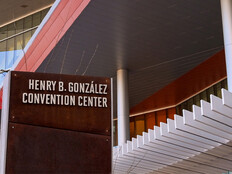When the Students Become the Teachers
Brady Hesse, an eighth-grader at Bridgetown Middle School in Cincinnati, likes all things digital. That's not unusual for boys his age, many of whom would rather play video games than do just about anything else.
So when Hesse heard about an opportunity to play with computers during the school day, he jumped at the chance. "It was something new to do," he says of eKIDs, a program overseen by the city's Oak Hills Local School District (OHLSD) that allows students to learn several technologies, teach them to their classmates and then work with teachers to incorporate them into the existing curriculum.
"I didn't really know what we were going to do," Hesse adds, "but I like using technology."
Soon, he was creating and animating his own digital sketches. "We could make animations and then choose what they would do — move, change colors and that kind of thing," Hesse recalls. "After we learned about it, we applied it to our art classroom and taught all of the other kids how to use it."
Although Hesse and other eKIDs participants weren't familiar with the software when the semester began, they learned quickly. And they enjoyed the challenge of sharing that knowledge with others. "It was fun to teach our class," says Bridgetown student Anthony Feucht, who, like Hesse, participated in the spring 2011 program as a seventh-grader. (Both boys are enrolled in eKIDs this year as well.) "We knew all of the students, so it was easy to go in and teach them something."
Origin Story
Concerned that technology wasn't being used to its full potential, a team of teachers and administrators led by Tracy Pirkle, OHLSD's director of curriculum and eLearning, conceived of the eKIDs program in summer 2009. "We have a lot of technology in our district," Pirkle says, "and we are dedicated to providing the students the opportunity to learn how to use it. That's especially important when they leave us: Are they ready for their next step?"

Tracy Pirkle (center) led a team in the creation of eKIDs, which aims to help Oak Hills Local School District students become experts in certain technologies and then share that knowledge with others. Bridgetown Middle School students (from left) Allie Schaefer, Logan Cox, Brady Hesse and Anthony Feucht are among the current group of students enrolled in the program.
Photo: Jonathan Robert Willis
But despite the array of technology tools at teachers' disposal, she adds, students "weren't using them in class every day, as we had hoped."
So Pirkle and her colleagues wrote a curriculum and launched eKIDs as a pilot program in fall 2010. (The acronym stands for "eLearning Kids In Demand," she says.) Ten seventh-graders from each of the district's three middle schools were given access to HP netbooks, netbook computer carts and open-source software that they could use both in school and at home. (The district is currently considering purchasing and adding handhelds and touch-screen tablets to the eKIDs program.)
The 2010–2011 pilot was so successful that OHLSD officials have expanded eKIDs to its five elementary schools. Currently, students in grades 4 through 12 are eligible to participate. Middle school students receive high school credit for their eKIDs work, which they share with their teachers and classmates at the end of the semester. Elementary students complete similar projects but don't earn credits until they participate at the middle school level.
The eKIDs curriculum, which changes every semester, offers eight modules for students to pursue (see sidebar, "Modus Operandi"). Most can be completed in a semester, Pirkle says, but "there might be a student or two who gets so into a project that we extend it into the next semester." The modules, which are project-based, are taught as a course. Students can work on them as individual projects or in small groups and can take as long as they need to master each module before moving on to the next one.
"We ask the kids, if they had spare time, which of these sets of activities would they want to do?" Pirkle says. "They have a real bent toward technology. It's a very natural interest for them."
Despite their affinity for technology, most of the program's participants aren't yet considering what they'll do with their newly acquired knowledge. "There's a shortage of people in technology careers in our area," Pirkle explains, "and it isn't an obvious field for our kids. They might really like to play video games and toy around with computers, but they haven't thought about future tech-related career opportunities."
The students themselves say they signed up for the chance to spend school time learning about computers and other technologies — things they deem cool already.
"When I heard about the program, I wanted to do it," says Allie Schaefer, a Bridgetown seventh-grader who joined eKIDs in August, at the start of the 2011–2012 school year. "Usually, teachers teach kids. But with eKIDs, the kids teach the teachers. That's pretty cool."
Knowledge Is Power
This year's eKIDs participants are currently studying TEDTalks, a program created by the nonprofit Sapling Foundation through which leading thinkers disseminate "ideas worth spreading" at events around the world. (Since its inception five years ago, more than 1,040 TEDTalks have been recorded and broadcast at ted.com.) Pirkle says eKIDs students will be hosting their own TEDx YouthDay event on Nov. 20, during which they will present and film their own researched talks and then share the videos online.
That was enough to catch the attention of Bridgetown seventh-grader Logan Cox, who joined eKIDs this fall. "I thought I could do one," he says of TEDTalks. "They're pretty cool."
SOURCE: National Center for Education Statistics (State Education Reforms, 2008–2009)
The eKIDs program appealed to him, he adds, because he wants to pursue an architecture or engineering career and knows that a mastery of technology will be necessary.
Students from the eKIDs pilot say the experience taught them much more than technology, however. "We were able to develop our public speaking," Feucht says. "We did a lot of problem-solving and learned about different points of view."
Hesse agrees, noting that he and other participants had to put more effort into teaching the technologies to their classmates than he had expected when he signed up for the program. "We practiced for a few days beforehand so we'd have a rough idea of how things would go," he says.
In Pirkle's view, that kind of practical knowledge is a bonus.
"It's all based on a rubric," she says of the program's curriculum. "Once a student finishes all of the requirements of a module, they get a high school credit. Each module touches on online research and safety and includes a unit through which the students dive deep into a technology. Then, they look into every area of that tool to see how it can be used in school."
Teachers see value in the program too. "The kids who participated last year loved it, and it definitely went over well," says Kara Farquhar, a seventh-grade science teacher at Bridgetown.
Modus Operandi
Oak Hills Local School District's eKIDs program is a component of its larger e-learning initiative, which aims to foster "anywhere, anytime, any device" learning using a variety of hardware, software and connectivity tools. Tracy Pirkle, the Cincinnati-based district's director of curriculum and eLearning, says eKIDs follows a similar model, offering learning opportunities that teach public speaking and research skills (as well as technology skills).
For example, the first module in this year's eKIDs curriculum focuses on TEDx YouthDay, a series of educational events happening around the world on Nov. 20 to empower and inspire young people. The students are spending the year researching a topic, writing their own presentations, committing them to video and uploading them to the web.
According to Pirkle, the first module is broken into the following lessons:
- Getting Started, which explains the eKIDs mission and goals and the tools that they will use throughout the semester;
- Teaching as Leading;
- Optional Technology Topics (using student-owned handheld devices in instruction, for example);
- Cybersafety;
- Online Research and Information Literacy; and
- Wrap-Up.
A second module focuses on problem solving and customer service, along with in-person and online communications. Six additional modules (in development now) will follow a similar template, offering multiple lessons while teaching a technology, which students will then share with their classmates.







